Afghanistan War, CIA Sponsored Terror, Civil Liberties, Criminalizing Dissent, Gaza, Habeas Corpus, Human Rights, Surveillance, Targeting Muslims, Torture, Truth to Power
Podcast: Play in new window | Download
Updates:
- Hosts Update On Hurricane Sandy
- Obama Re-election: What Does It Mean For Basic Civil Rights? Drones, Guantanamo, Military Commissions, Warrantless Wiretapping.
- PLO and CCR Victory – Muhammad Salah
- Holy Land Case Update – Supreme Court Refuses To Review Sixth Amendment Right
—-

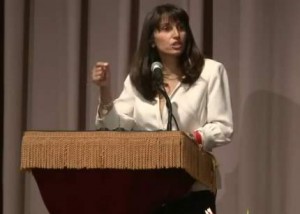
Russell Tribunal on Palestine: Attorney Diana Butto
The final session of the Tribunal focused on the responsibility of the United States of America and the United Nations regarding the Israeli breaches of international law towards Palestine and Palestinians. There is now a situation in which Israel has achieved a status of immunity and impunity, facilitated by the US, despite its complete disregard for the norms and standards of international law. We hear an excerpt of a speech by Human Rights Attorney Diana Butto at the Russell Tribunal on Palestine.
Diana Buttu is a Palestinian–Canadian lawyer and former spokesperson with the Palestine Liberation Organization.
She is best known for her work as a legal adviser and negotiator on peace negotiations between Israeli and Palestinian organizations. Buttu was born in Canada to Palestinian parents. She began her work as a negotiator in 2000, shortly after the outbreak of the Second Palestinian Intifada, as a spokesperson for the Negotiations Support Unit of the Palestine Liberation Organization.
—-
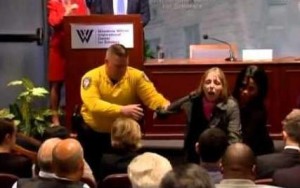
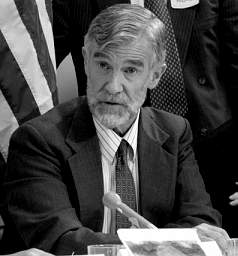
The Moral Challenge of ‘Kill Lists’ by Ray McGovern
The Obama Administration has conducted hundreds of drone strikes in several countries, killing civilians and a US citizen. Critics point out that as the Obama Administration assassinates its’ suspects, it also avoids the legal complications of detention. In last week’s New York Times, authors Jo Becker and Scott Shane expose the priest-like role of counter terrorist adviser John Brennan as he provides Mr. Obama with the moral justification for extrajudicial murder. The framing of John Brennan’s role of priestly adviser caught Ray McGovern’s attention. His recent article The Moral Challenge of Kill Lists, dissects the New York Times story.
Ray McGovern:
- There has been a geometric increase in the number of drone strikes against Pakistan and of course Somalia and Yemen.
- London based bureau for investigative journalism estimates that about 830 civilians including women and children may have been killed by drone attacks in Pakistan. 138 in Yemen, and 57 in Somalia. It’s incredibly naive to think that this helps in any way in the war on terrorism.
- This wonderfully insightful and dangerous New York Times article a week ago talked about the conundrum of aligning these activities with US legal and moral principles. Conundrum? That’s an impossibility.
- The Fifth Amendment prevents this sort of thing if you take the interpretation we’ve always had.
- As the New York Times article mentions 1 out of 30 assassinations that are known about just one escaped assassination and was brought before a court. It’s much easier to kill them.
- If you wanted to learn about al-Qaeda, don’t you think Osama Bin Laden could’ve told us some stuff about al-Qaeda?
- Any military aged male in the area of a “bad guy” is fair game.
- Maybe I can draw from my own experience in the CIA, I know about lists. I know that when there was a coup attempt in Indonesia in 1965, that there were lists given to the Indonesian authorities of communists. How many communists on that list? A million. How many were killed, were murdered? 500 thousand plus. How many were put in prison? The other 500 thousand.
- The drones are really accurate but the target information is notoriously inaccurate.
- I love Fordham and I hate to see the administration and the very wealthy trustees who have lots of money to give to Fordham, determine who comes in to give the commencement address.
- I think that you have to have some kind of personal involvement with innocent suffering. I think that you have to have some sense of the injustice others suffer to let your heart be touched by this direct experience.
- Obama’s fallen in with a rough crowd.
- I was attracted to getting outside of my Catholic walls. There’s a small church down in Washington DC called the Church of the Savior.
- I found out they were doing wonderful things like preventing housing from being gentrified so poor people can still live there. Healthcare, jobs, addictions, a hospice for people to sick to be on the street.
- There’s been one major change for the good in this country. That is Occupy.
- When you look for proof that Occupy has incredible potential, look no farther than what the president and the top senators thought necessary to inject into the NDAA on New Year’s Eve, which allows them to use the US Army of all things to wrap us all up without charge, without court proceedings.
Guest – Raymond L. McGovern, retired CIA officer turned political activist. McGovern was a Federal employee under seven U.S. presidents in the past 27 years. Ray’s opinion pieces have appeared in many leading newspapers here and abroad. His website writings are posted first on consortiumnews.com, and are usually carried on other websites as well. He has debated at the Oxford Forum and appeared on Charlie Rose, The Newshour, CNN, and numerous other TV & radio programs and documentaries. Ray has lectured to a wide variety of audiences here and abroad. Ray studied theology and philosophy (as well as his major, Russian) at Fordham University, from which he holds two degrees. He also holds a Certificate in Theological Studies from Georgetown University. A Catholic, Mr. McGovern has been worshipping for over a decade with the ecumenical Church of the Saviour and teaching at its Servant Leadership School. He was co-director of the school from 1998 to 2004. Ray came from his native New York to Washington in the early Sixties as an Army infantry/intelligence officer and then served as a CIA analyst from the administration of John F. Kennedy to that of George H. W. Bush. Ray’s duties included chairing National Intelligence Estimates and preparing the President’s Daily Brief, which he briefed one-on-one to President Ronald Reagan’s most senior national security advisers from 1981 to 1985.
Afghanistan War, CIA Sponsored Terror, Civil Liberties, Criminalizing Dissent, Gaza, Human Rights
Podcast: Play in new window | Download
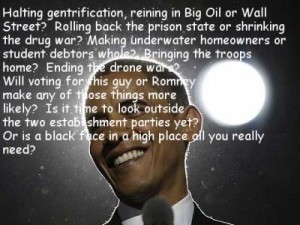

Crisis In Syria Update: Black Agenda Report
Thousands of Syrians have died in the escalating conflict between forces loyal to President Bashar al-Assad and those that oppose his leadership. The vicious internal power struggles have forced tens of thousands of Syrian refugees into other countries including Turkey. This conflict could represent a threat to world peace according to UN based human rights groups.
Glen Ford:
- We have to see a global system that’s in crisis that has clearly decided that International Law, a body of international law that the United States had so much do with erecting after World War II.
- That body of International Law is no longer useful or tolerable to US empire.
- There is no international legitimacy as to what’s happening in Syria, which has now become a US model.
- It can gather in an ad hoc way any volunteer group of nations and pretend there is international legitimacy to the aggression that they mount.
- This time its against Syria, they’ve enlisted. They’re making a war, the NATO countries and gulf kingdoms against Syria.
- There is no concept here of inalienable rights of nations to run their own internal affairs.
- I believe the US saw the Arab Spring as a existential crisis.
- If they cannot achieve cleanly, the kind of regime change that they hope to achieve they do not hesitate to resort to the imposition of chaos.
- We’ve seen that in Africa for the last 50 years. That which we can’t directly control, we will through into chaos.
- They will be satisfied with years and years of chaos, and social disintegration and great loss of life.
- Muslim fundamentalism behaves very much like a nationalism.
- These jihadis have done the US a great service and they do know it.
- Despite the global financial crisis, and we’re still suffering from it unless we are banks, we do not have a political crisis.
- You only have a political crisis when there is effective resistance.
- When you have effective resistance then you have a conversation that is hostile to the order.
- Romney and Obama, there are no fundamental differences between these two people.
- We have these little dust ups off to the side made to look like arguments. The Republicans didn’t want modest taxes on the rich. That is all that separates them.
- Black America has historically been the point constituency for change in the United States.
- It is only with the passing on of this black president we’re going to see such a movement.
- The advent of a black in the White House has totally neutralized the black politic. It has short circuited our instinctive reactions to travesties wrought by power.
Guest – Glen Ford, founder of the Black Agenda Report and many other media forums. Ford was a founding member of the Washington chapter of the National Association of Black Journalists (NABJ); executive board member of the National Alliance of Third World Journalists (NATWJ); media specialist for the National Minority Purchasing Council; and has spoken at scores of colleges and universities.
—-
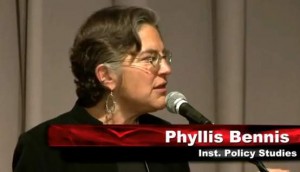
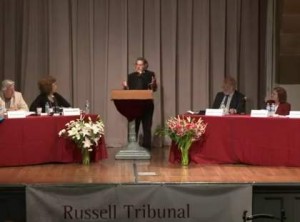
Russell Tribunal on Palestine: Phyllis Bennis
The final session of the Tribunal focused on the responsibility of the United States of America and the United Nations regarding the Israeli breaches of international law towards Palestine and Palestinians. There is now a situation in which Israel has achieved a status of immunity and impunity, facilitated by the US, despite its complete disregard for the norms and standards of international law. We hear an excerpt of a speech by Phyllis Bennis at the Russell Tribunal on Palestine.
Speaker – Phyllis Bennis, director of the New Internationalism Project at the Institute For Policy Studies. She is also a fellow of the Transnational Institute in Amsterdam. She has been a writer, analyst, and activist on Middle East and UN issues for many years. In 2001 she helped found and remains on the steering committee of the U.S. Campaign to End Israeli Occupation. She works closely with the United for Peace and Justice anti-war coalition, co-chairs the UN-based International Coordinating Network on Palestine, and since 2002 has played an active role in the growing global peace movement. She continues to serve as an adviser to several top UN officials on Middle East and UN democratization issues.
————–
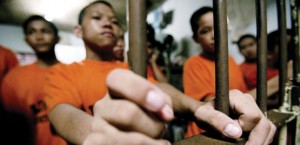

Locking Away Children For Life Without Parole
The United States is the only country in the world that sentences children to life, without the possibility of parole. Last month, the US Supreme Court revisited the question of whether juveniles convicted of murder should be given mandatory life sentences without the possibility of parole. The Supreme Court had once ruled against imposing death sentences on juveniles and imposing life sentences on youth who aren’t convicted of murder. Currently, 2500 kids in jail are serving life sentences without parole in the US. 371 of those individuals are in Michigan prisons. Our next guest has been working on a lawsuit on behalf of 9 Michigan individuals who were sentenced to life in prison for crimes committed when they were minors and who are being denied the possibility of parole.
Attorney Deborah LaBelle:
- The concept that we’ve been talking about that these are children both under international law and US law for civil matters, children are different from adults.
- The Supreme Court seemed to readily grasp that, they weren’t speaking about juveniles or teenagers or young adults, they spoke continuously on what to do about children who are involved in homicide crime.
- The court had two cases in front of them, both involving 14 year olds, one in which the 14 did not commit a homicide, but convicted of either felony murder or aiding and abetting.
- That juvenile got mandatory life without possibility of parole, because the child was sentenced as an adult, the other case, the 14 year old actually committed the homicide.
- There is a handful of states, Michigan and I think 8 others who treat 17 year olds always as adults for all purposes in the criminal justice system.
- Under the 38 states, there’s a whole range, some you can only get life without parole, if you’re 16 and up, some allow it for 15, some states allow it for a child of any age, Michigan is one of them.
- One of the justices talked about that. Is there an age in which we would all share a collective cringe. What about a 5 year old, what about a 10 year old.
- The frontal lobe area of the brain that really addresses impulse control and long term consequences, and control issues of risk management, is developing through adolescence.
- People draw the age at different points, some say not til 19, some not til 23 as you say.
- There’s a bright line in civil law that’s been drawn in civil law that youth have a maturity that they can vote, when they can decide to leave school, when they can drink in some places, when they can drive.
- There are these bright lines.
- Every other country who has signed on to the conventions of the rights of the child which prohibits putting children in prison for life without possibility of parole explicitly has recognized that this practice is banned.
- The only other country that hasn’t signed on is Somalia and they don’t quite have a government right now to do that.
- We stand alone in not adhering to that convention on the rights of the child as well as we stand alone on approving this sentence.
- We have over 2500 youth who are serving of life without any possibility of parole. About 70 percent are children of color. A third of them, did not commit homicides.
- No one is arguing that there might not be circumstances, that a state couldn’t decide upon review that child couldn’t be released. What the argument is, you can’t keep them in there without any hope. You have to give them an opportunity to demonstrate upon maturation that they have been rehabilitated and they aren’t a threat to public safety.
- We should think of putting children in places where we can nurture, council and believe in their rehabilitation and give them a second chance.
- I read transcript after transcript of judges saying, – listen I don’t want to do this to this 14 or 16 year old, but I don’t have any choice. What is the value of putting a child away with no hope. It’s certainly not a public safety issue, because that can be addressed by the state by having parole or review hearings.
Guest – Attorney Deborah LaBelle, an attorney with the ACLU of Michigan’s Juvenile Life Without Parole Initiative.
—————————————–
Afghanistan War, Civil Liberties, Criminalizing Dissent, Extraordinary Rendition, Gaza, Guantanamo, Habeas Corpus, Human Rights, Military Tribunal, Political Prisoner, Targeting Muslims, Torture, Truth to Power, War Resister
Podcast: Play in new window | Download
Updates:
—
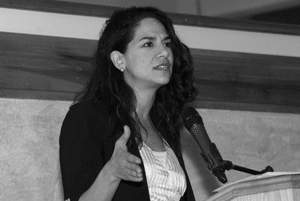

Russell Tribunal on Palestine Findings
We follow up on the findings of the Russell Tribunal on Palestine. As many listeners may know, the tribunal was created in response to the international community’s inaction regarding Israel’s recognized violations of international law. Jury and speakers included Angela Davis, Noam Chomsky, Ilan Pappe, Peter Hansen, Diana Buttu, Phyllis Bennis, Katie Gallagher and Russell Means.
Attorney Noura Erakat:
- Each of the sessions focuses on a different component of the problems that has led to a failure to achieve a solution to what some may describe as the Palestinian-Israeli conflict.
- More specifically to achieve Palestinian self-determination and equality with their Jewish-Israeli counterparts.
- The first tribunal explored the EU complicity. A condition for Israel’s acceptance into the United Nations was its acceptance of returning refugees to their homes per UN Resolution 194.
- Since the 1967 war they’ve been supported by unequivocal US financial, military and diplomatic support.
- Corporate complicity: The corporations that are involved in funding the Israeli military arsenal and its construction arsenal to expand its colonial settlements in the Occupied Territory as well as building a wall deemed illegal by the National Court of Justice.
- This fourth and final session brought everything back to the U.S.
- To New York specifically because the U.S. has proven to be the primary obstacle in resolving this conflict.
- Consider first that Israel has received 115 billion dollars in aid since World War 2. Making it the highest recipient of US foreign aid.
- In addition to that Israel receives approximately 3 billion dollars a year. It receives money without any review in US law, specifically the Arms Export Control Act which conditions that all US aid to foreign countries must be used to further human rights or in self defense.
- The US is shielding Israeli responsibility in the UN Security Council
- The resolution process is stonewalled internationally.
- One of the things that we’d love to do is remove the veto power from the five permanent members of the UN Security Council.
- BDS Movement: 2011 – Dock Workers refused unload Israeli products from a boat.
- EndtheOccupation.org
Guest – Attorney Noura Erakat, human rights attorney and activist. She is currently a Abraham L. Freedman Teaching Fellow at Temple University, Beasley School of Law and the U.S. based Legal Advocacy Consultant for the Badil Resource Center for Palestinian Refugee and Residency Rights. She has taught international human rights law in the Middle East at Georgetown University since Spring 2009. Noura also has helped seed BDS campaigns as a national grassroots organizer with the US Campaign to End the Israeli Occupation.
———-
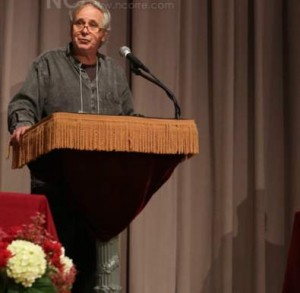
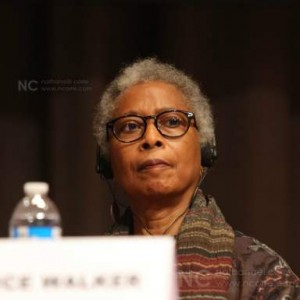
Russell Tribunal on Palestine: Ilan Pappé Speech
The final session of the Tribunal focused on the responsibility of the United States of America and the United Nations regarding the Israeli breaches of international law towards Palestine and Palestinians. There is now a situation in which Israel has achieved a status of immunity and impunity, facilitated by the US, despite its complete disregard for the norms and standards of international law.
Speaker – Ilan Pappé, an Israeli historian and activist. He is currently a professor with the College of Social Sciences and International Studies at the University of Exeter in the UK, director of the university’s European Centre for Palestine Studies, and co-director of the Exeter Centre for Ethno-Political Studies. He is the author of The Ethnic Cleansing of Palestine (2006), The Modern Middle East (2005), A History of Modern Palestine: One Land, Two Peoples (2003), and Britain and the Arab-Israeli Conflict (1988)
——————————————————————————-
Afghanistan War, Civil Liberties, Criminalizing Dissent, Human Rights, Iraq Veterans, Truth to Power, War Resister
Podcast: Play in new window | Download
Updates:
—-
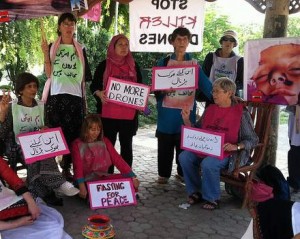
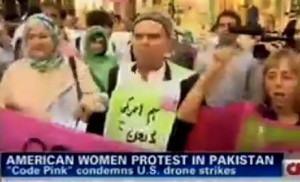
Anti-Drone Action: Code Pink Delegation to Pakistan
Two weeks ago a delegation of 40 members from Code Pink traveled to Pakistan protesting US drone strikes. The group is also visiting families of those injured or killed by drones and to encourage relations amid the broader Muslim world. The delegation is made up of students, doctors, veterans, retirees and artists. Recently the group set out on a massive anti-drone march in Waziristan where drones have killed many civilians. In one statistic, within two years more than 90 drone attacks have killed 5000 innocent Pakistanis. We get an update on the delegation from Code Pink member Rae Abileah. Rae is the co-director of CODEPINK Women for Peace. She is also a founding member of Young Jewish Proud, the youth wing of Jewish Voice for Peace. Rae has visited Israel and the West Bank several times, and has traveled to Gaza and Iran.
Rae Abileah:
- I’m the co-director of Code Pink nationally. Medea Benjamin, co-founder of Code Pink has been doing work on drones for the past year and a half. She recently wrote a book Drone Warfare: Killing By Remote Control
- She partnered with PTI, the Pakistani Political Party and their leader and a well known lawyer for drone victims.
- They got this delegation rolling and ended up with 35 Americans in Islamabad setting out on this caravan to march to a place where really in the past decade no Americans have gone to.
- They put their bodies on the line and joined these Pakistanis going on this march.
- People in Waziristan are living with drones overhead, they don’t know when the next attack is going to come.
- It started out as a car caravan with more than 100 vehicles, they drove for hours.
- The goal was to get to south Waziristan the epicenter of the US drone attacks.
- President Obama has declared all young men in Pakistan to be potential militants. It gives the green light to shooting civilians.
- These soldiers are sitting there all day looking at the screen as if its a video game.
- These military pilots are going to work all day, pressing buttons that kill people thousands of miles away and going home to their dinner table in Vegas at night.
- It’s a primary tool for attracting militants to join the Taliban.
- We’re continuing to build grassroots support to oppose Obama’s drone program.
- During the delegation we were actually able to deliver thousands of signatures collected on a stop drones petition directly to Obama at one of his fundraisers in San Francisco.
- In Congress there’s also a Drones Caucaus, the leaders such as Bill Buck McKeon are taking hundreds of thousands of dollars from drone manufacturers.
- Soda Stream is manufactured in an illegal settlement in the occupied territories.
Guest – Rae Abileah, co-director of CODEPINK Women for Peace and is a co-organizer of Occupy AIPAC, Stolen Beauty boycott of Ahava cosmetics, and Women Occupy. Rae is a contributing author to 10 Excellent Reasons Not to Join the Military; Sisters Singing: Incantations, Blessings, Chants, Prayers, Art and Sacred Stories by Women; Beyond Tribal Loyalties: Stories of Jewish Peace Activists; and Beautiful Trouble: A Toolbox for Revolution. She lives in San Francisco, CA.
——

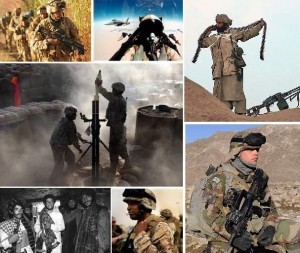
11 Years of War In Afghanistan
This month marks 11 years since the colonial war in Afghanistan was launched. Operation Enduring Freedom armed forces include the United States, the UK, Australia and the Afghan United Front. We’ve talked with past guests about how multi-national corporations are involved to integrate Afghanistan into the global system by building schools and infrastructure. We’ve also talked about the strategic energy alliances forming between Russia and China on one side and how three Caspian Sea oil companies continue to lock the US in to the war.
Phyllis Bennis:
- This already the longest war in history.
- We hear from President Obama that within the year 2014 combat troops will be withdrawn.
- We’re hearing new calls from different forces including most recently the Secretary General of NATO indicating there was a possibility that NATO may pull out its troops earlier then the end of 2014 because of the insider killings.
- The only figures we have began in 2007, they began counting some confirmed deaths. About 13 thousand Afghan civilians only since 2007.
- The US is there in two ways, the US has a commander happens to be the NATO commander. Other US troops are there separately. The US has almost 70 thousand troops there now, NATO has 40 thousand other troops and there are about 90 thousand US paid contractors.
- US troop casualties: Even that now is unclear.
- Last week a number of press outlets reported the 2000th US military casualty.
- Young people in Afghanistan join the military for the same reasons young people in the United States join the military, because they’re desperate for a job.
- Remember a couple of weeks ago 9 Afghan women and little girls were killed gathering wood before dawn to build a fire, to make breakfast.
- The Pentagon said, oh sorry, and somehow think that its going to make it ok.
- Add to that the lack of cultural sensitivity, the lack of language training so there’s no sense from soldiers on the ground that they have any idea what this culture is about, who these people are.
- Afghanistan is about 25 million people, the vast majority don’t live in the cities. They live in tiny hamlets and small towns, small villages, very scattered.
- What we’re seeing is an expansion of the global war on terror.
- There is an anti-war movement it’s just not as visible as we’ve seen in earlier times.
- That’s the hardest part of our work, its not building an anti-war movement, its making our government take into account the opinions of not only a movement but the American people.
- Understanding the Palestinian Israeli Conflict.
Guest – Phyllis Bennis, director of the New Internationalism Project at the Institute For Policy Studies. She is also a fellow of the Transnational Institute in Amsterdam. She has been a writer, analyst, and activist on Middle East and UN issues for many years. In 2001 she helped found and remains on the steering committee of the U.S. Campaign to End Israeli Occupation. She works closely with the United for Peace and Justice anti-war coalition, co-chairs the UN-based International Coordinating Network on Palestine, and since 2002 has played an active role in the growing global peace movement. She continues to serve as an adviser to several top UN officials on Middle East and UN democratization issues.
———————————————————————-
Afghanistan War, CIA Sponsored Terror, Civil Liberties, Criminalizing Dissent, Extraordinary Rendition, FBI Intrusion, Guantanamo, Habeas Corpus, Human Rights, Political Prisoner, Prison Industry, Prosecution of the Bush Administration, Supreme Court, Targeting Muslims, Torture
Podcast: Play in new window | Download
Updates:
——
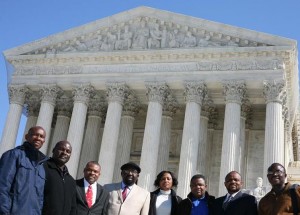
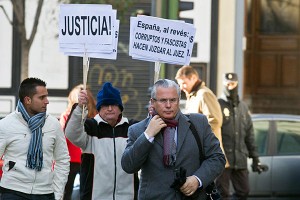
Universal Jurisdiction: Kiobel v. Royal Dutch Shell / Bush 6 Case In Spain
This week the US Supreme Court will decide if corporations could be held liable in U.S. courts for violations of international human rights law in the land mark case Kiobel v. Royal Dutch Petroleum. The case was brought by families of seven Nigerians who were executed by a former military government for protesting Shell’s exploration and development and is pushing to hold corporations accountable for human rights violations. The Supreme Court will also consider how the Alien Tort Statute Claim can be used the Kiobel case. A one sentence law that goes back to 1789 when the first judiciary act was brought in the United States. We’ve discussed this statute with several past guests including attorneys Peter Weiss and Rhonda Copeland who were instrumental in beginning the first cases in which human rights violations, taking place in other countries could actually be litigated in the United States.
We also discuss the recent amicus filing by a group of international human rights organizations and experts before the Spanish Supreme Court. The brief asks the Spanish Supreme Court to overturn a decision not to pursue a criminal case against six former officials from the Bush administration for their role in directing and implementing a systematic torture program. Past shows with Katherine Gallagher.
Attorney Katherine Gallagher:
- The Kiobel case has been in US courts since 2004.
- The claims were brought in the Southern District of New York, under a law from 1789, known as the Alien Tort Statute.
- This law allows non-US citizens to come into a US federal court and assert violations of the Laws of Nations or International Law.
- A recent precedence for this is Citizens United, what happened was that the Second Circuit ruled that corporations could not be held liable for these egregious human rights violations under the Alien Tort Statute.
- The question of corporate liability went up to the Supreme Court first.
- We had 2 judges from a 3 bunch panel in the Second Circuit suddenly come out in the fall of 2009 and say there is no corporate liability. That is the question that went up to the Supreme Court.
- Four other circuits had look at this question and they said of course corporations can be held as liable as an individual, a natural person.
- The Alien Tort Statute allows for a civil suit and civil liability rather than criminal liability.
- The key case from 1980 that CCR brought, the case of Filartiga, this case which the Supreme Court affirmed in 2004 as being on solid legal basis, claims by a Paraguayan, against a Paraguayan for actions that occurred in Paraguay.
- So its very strange that the Supreme Court was asking in a very broad fashion whether the ATS could apply to actions that occurred in another country. That is what the bulk of the cases brought under the ATS have been about.
- Some of the cases where the ATS is used are for some of the most serious violations. Cases of war crimes, crimes against humanity, torture, not your run of the mill case.
- What the justices seem to coalesce around was the issue of whether there’s an alternate forum. If the claims against Shell could have been brought in the UK or in the Netherlands, maybe they don’t need to be brought in the US.
- We’ve seen a trend in the last 20 years of other countries adopting stronger laws that allow for redress, and accountability, so we don’t have to be the world’s policeman.
- There have been 2 cases that percolated up in the last 4 years in Spain.
- The first is a widespread investigation of the torture program then Judge Balthazar Garzon. This is a case looking at torture in Guantanamo, and potentially in Iraq and Afghanistan, looking at the whole U.S. torture program. That case was brought on by 4 named plaintiffs.
- That case is very wide ranging, and willing to go up the chain of command as far as the evidence leads.
- There is a second case that was brought against specific U.S. individuals. They’re known as the Bush 6, including, Jay Bybee, John Yu, David Addington, Alberto Gonzalez. Six men who served as lawyers and argued to have essentially created both the legal structure that enabled the torture program, providing arguements for immunity and protecting participants of the torture program from accountability.
- Spain has a long and proud history of upholding International Law. Spain is where we had the case against Augusto Pinochet in the late 90s.
- We’ll be doing this as long as we need. We need to have accountability, its really critical.
Guest – Katherine Gallagher, Senior Staff Attorney at the Center for Constitutional Rights (CCR), where she focuses on holding individuals, including US and foreign government officials, and corporations, including private military contractors, accountable for serious human rights violations. Among the cases she has worked, or is working, on are international accountability efforts for U.S. officials involved in torture (Spain, Switzerland, Canada); ICC Vatican Officials Prosecution; Arar v. Ashcroft, Corrie v. Caterpillar, Matar v. Dichter, Saleh v. Titan, Al-Quraishi v. Nakhla and L-3, Estate of Atban v. Blackwater.
—————————————————————————————————
Afghanistan War, CIA Sponsored Terror, Civil Liberties, Criminalizing Dissent, Extraordinary Rendition, FBI Intrusion, Guantanamo, Habeas Corpus, Human Rights, Iraq War, Military Tribunal, Political Prisoner, Targeting Muslims, Torture
Podcast: Play in new window | Download
Updates
- Michael Ratner: Update on Verdict – Corrie v State of Israel
- Cardinal Dolan Who Approved Payoffs For Priests Accused of Sex Abuse To Leave Priesthood Gives Speech At RNC and Closing Speech for DNC
—–

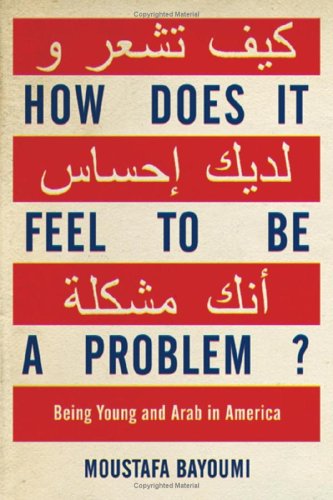

Islamophobia: Anatomy of an American Panic
In the last few weeks, 8 places of worship connected with South Asians or Middle Easterners have been targets in the United States. As many listeners know, six people were murdered at a Sikh temple in Oak Creek, Wisconsin but later that evening a mosque in Joplin Missouri was burned down. Other targets recently included mosques in Rhode Island, Southern California, Oklahoma City and Dearborn, Michigan. These tragic events mark another wave of existential Muslim threats inciting fear and violence against Middle Eastern people while helping to justify the ongoing war on terror.
According to the University of Maryland’s National Consortium for the Study of Terrorism and Response to Terrorism, since 9/11 to 2010 there have been 155 terror incidents in the U.S., and exactly two of them or 1.3 percent have been attributed to international Islamist terror groups. The majority of events involved individuals such as anti-abortionists, right-wing extremists, or extreme animal rights activists.
The Nation Magazine has highlighted the disproportional focus put on Muslim communities in a special issue titled “Islamophobia: Anatomy of an American Panic.” We talk with journalist Lizzy Ratner and authors Deepa Kumar and Moustafa Bayoumi who contributed articles to the Nation Magazine special.
Lizzy Ratner:
- The Nation did a special issue about Islamophobia. It came out in the beginning of July. You can still find the majority of the articles online. The real credit has to go to Abdeen Jabara whose idea this really was.
- The civil rights attorney came to me last year and said the anti-Arab, anti-Muslim has reached fever-pitch.
- So I began to do some research about what exactly was going on and very quickly compiled a massive roster of possible articles.
- For the most part, the Left and Progressives have been far too quiet.
- This bigotry that is flourishing right now has a real history, it’s not a just a product of 9/11 and the post 9/11 era.
- Some of the seeds of bigotry have to do with the role of the United States historically in the Middle East.
- Islamophobia served an agenda and a number of purposes.
Guest – New York City journalist Lizzy Ratner has written extensively for the Nation and Alternet on issues involving Islamophobia. Lizzy is also co-editor of The Goldstone Report: The Legacy of the Landmark Investigation of the Gaza Conflict.
——
Moustafa Bayoumi:
- I was happy to see that the Nation was happy to take on the question of Islamophobia for a double issue.
- There’s been a shift in the last ten years from paranoia around security to a paranoia about the basic facts of Muslim life in the United States.
- In a way you can say it’s a shift from security to culture.
- At any stage, anything that has to do with a daily concerns about living a life as a Muslim American, somehow now becomes charged with sedition. Part of the funding of the anti-Muslim movement in the United States is basic conservative politics and extreme conservative politics.
- And also due to the Israel-Palestine conflict. So people who want to come aboard Israel will make a very distorted picture of what Muslim life is like.
- The NYPD has now a decade long history of “othering” the Muslim-American community.
- The NYPD had been screening The New Jihad for its new recruits.
- It’s a crazy film saying that all of the American Muslims are here as a fifth column ready to pounce. It’s a training film for new recruits. That’s true for the Pentagon and the FBI.
- Muslim Americans are still seen as perpetual foreigners.
- That Muslim American rights are different than everyone else’s rights.
- You’re average American consumer of media does not relate to the victims of the Oak Creek massacre because they don’t see them as being part of the American family.
- They asked American’s in this poll, and 62 percent of the population has never met a Muslim.
- If you’ve never met a Muslim then it’s very easy to believe all these boogey man ideas. That’s why media plays an important role in this issue.
- The FBI (training manual) said that it was in the nature of Muslims to try to take over this country.
Guest – Author Moustafa Bayoumi wrote Fear and Loathing of Islam joins us, his book : Being Young and Arab in America, won an American Book Award and the Arab American Book Award for non-fiction. He is also a professor of English at Brooklyn College, City University of New York.
——
Deepa Kumar:
- As of late the anti-Muslim statements coming from Michelle Bachmann, Joe Walsh, all of whom are Republicans, there is a sense of which it is the Republicans who are responsible for Islamophobia, for the demonization of Muslims and so on.
- This brand of the war on terror gets hatched and part of that was language developed in the 1990s, called the Clash of Civilizations. It was a man named Bernard Lewis who first penned this term.
- It’s not so much we’re going to carry out revenge on Osama Bin Laden but that we’re going to rescue Afghan women. In the case of Iraq, we’re going to bring democracy when no weapons of mass destruction were found.
- This rhetoric has a long history it goes back to the 19th century.
- Both presidents need Islamophobia. They need to generate this fear and hatred of the “Muslim other.”
- Operation Boulder
- The Jonathan Institute holds this conference in Jerusalem . . Islamofacism, the roots are sown at that conference.
- The idea of this menacing Muslim enemy is not new. It was not something created after 9/11 but in fact it goes back a millennium.
- It’s about political goals but religious rhetoric gets used. Same thing with the re-conquest of Spain.
- The Islamophobic rhetoric is one that’s mobilized by the elite.
- I hold both Republicans and Democrats responsible. These rabid right wingers get their confidence from mainstream figures like Walsh, like Bachmann and others.
- The sad reality is that the Democrats have done nothing to counter this.
- The Democrats are not an ally in this fight.
- I take inspiration from 2 movements in the sixties, the civil rights movement and the anti-war movement. I think these 2 strategies need to come together in fighting Islamophobia.
- We have to take on both the far right and challenge the priorities of empire and bring together a multiracial coalition that can actually change a generation.
- It was President Clinton with Anti-Terrorism and Effective Death Penalty Act in 1996 which made it legal to actually deport people with secret evidence. We know this lays the basis for the Patriot Act. This has really been a bipartisan project in the interest of empire.
Guest – Deepa Kumar, an Associate Professor of Media Studies and Middle Eastern Studies at Rutgers University. Her work is driven by an active engagement with the key issues that characterize our era–neoliberalism and imperialism. Her first book, Outside the Box: Corporate Media, Globalization and the UPS Strike (University of Illinois Press, 2007), is about the power of collective struggle in effectively challenging the priorities of neoliberalism.
———————————————–






















